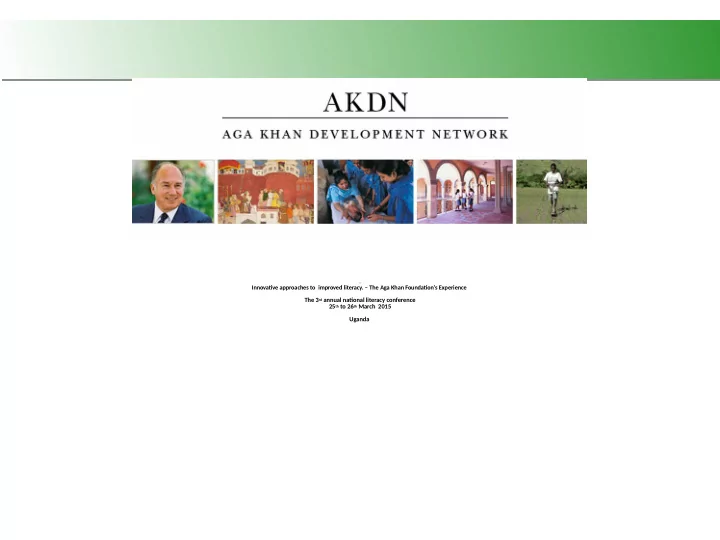

. Innovaive approaches to improved literacy. – The Aga Khan Foundaion’s Experience The 3 rd annual naional literacy conference 25 th to 26 th March 2015 Uganda
Aga Khan Foundation AKF works in collaboration with partners to develop and promote innovative solutions that contribute to improving the quality of life in East Africa.
Context in Rural Areas in Uganda • High repeiion and dropouts rates in primary • Not fully developed orthography • Quanity and quality of local language reading materials. • Muliplicity of languages with muliple dialects. • Proiciency in the mother tongue by teachers and school leaders. • High enrolment and muli grade classes. • No teachers guides for local language materials.
Context in Rural Areas in Uganda Grade 2 2009 mean scores in writen and oral literacy 60 59.19 54.18 45.70 40 53.7 Mean score 40.20 52.9 52.4 48.9 20 19.78 17.82 15.85 14.01 0 Amolatar Dokolo Amolatar Dokolo Oral literacy Written literacy C T Source: EAQEL Baseline 1, Aphrc 2009/10
Context in Rural Areas in Uganda Average scores 50 45 40 Grade 2 Boys 35 30 Grade 2 Girls 25 20 Grade 4 Boys 15 10 Grade 4 Girls 5 0 Grade 7 Boys Grade 7 Girls Source: AKF SIP Baseline report 2014
Context in Rural Areas in Uganda Percentage of children scoring 0 100 90 80 70 Grade 2 Boys 60 50 Grade 2 Girls 40 30 Grade 4 Boys 20 10 Grade 4 Girls 0 Grade 7 Boys Grade 7 Girls Source: AKF SIP Baseline report 2014
AKF Education Program Goal: C hildren and young people are equipped with the knowledge, skills, aitudes and values to help them interact efecively with the world and be contribuing members of society: • Increase equitable access to educaion for children in primary educaion; • Improve learning outcomes for primary school children; and • Strengthen local educaion systems and insituions that provide leadership and capacity building in educaion.
Program Approach School Improvement (SIP) model, a multi-faceted approach that addresses system strengthening at different levels, including community, school, district and provincial levels. Local Context Local Context Local Context Learning Experiences
Systemaic & Step SIP Systemaic & Step by Step by Step Instrucional Instrucional Approach Approach Coninuous Coninuous Mentoring & Mentoring & Parents’ Parents’ Support & ECOP Support & ECOP Engagement outside Engagement outside of school of school Child Pedagogical Pedagogical Culturally and Leadership & Culturally and Leadership & contextually relevant Support contextually relevant Support curriculum curriculum • Alignment with Governments’ Prioriies • Alignment with AKDN Equitable & friendly Equitable & friendly • Alignment with Global environment environment Agenda
Reading to Learn (RtL) … that breaks down An innovative the complex task of reading systematic & explicit step into manageable by step approach to teach concepts & steps & learn literacy. What is … that blends it? … that teaches all all literacy techniques: aspects of literacy, passing phonics, look & say, from context to words to context, language syllables & letters. experience,… … that is child- centered, focusing, also on personal development & social interactions. 11
RTL in Action
Reading for Children (RFC) Reading in School and Home Reading in School and Home 13
Local Teaching and Learning materials Versioning, translaing and prining with the support from the African Storybook project
Education Community of Practice
Impact of RtL Oral Literacy 30% 25% 20% Treatment (t1-t2) 15% Control (t1-t2) 10% 5% APHRC report 0% (March, 2012) 16
Impact of RTL work Written Literacy 35% 30% 25% 20% Treatment (t1-t2) Control (t1-t2) 15% 10% 5% 0% APHRC report (March, 2012) 17
Going forward • Coninue implemening the integrated SIP strategy in 150 primary schools in West Nile region • Integraing ICT in educaion • Enhancing the capacity of stakeholders to develop local language teaching and learning materials. • Insituionalizing the tested approaches within the local educaion systems and TTCs as well as working with the naional government for taking to scale
Partners • Government of Uganda • Department of Foreign Afairs, Trade and Development • Aga Khan University • Local Language Boards
T h a n k y o u
Recommend
More recommend